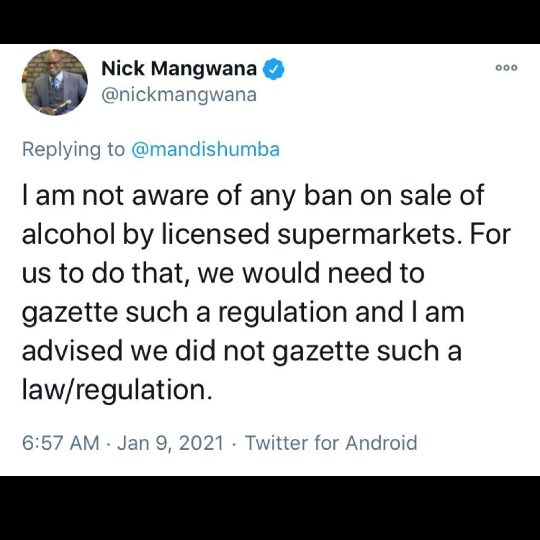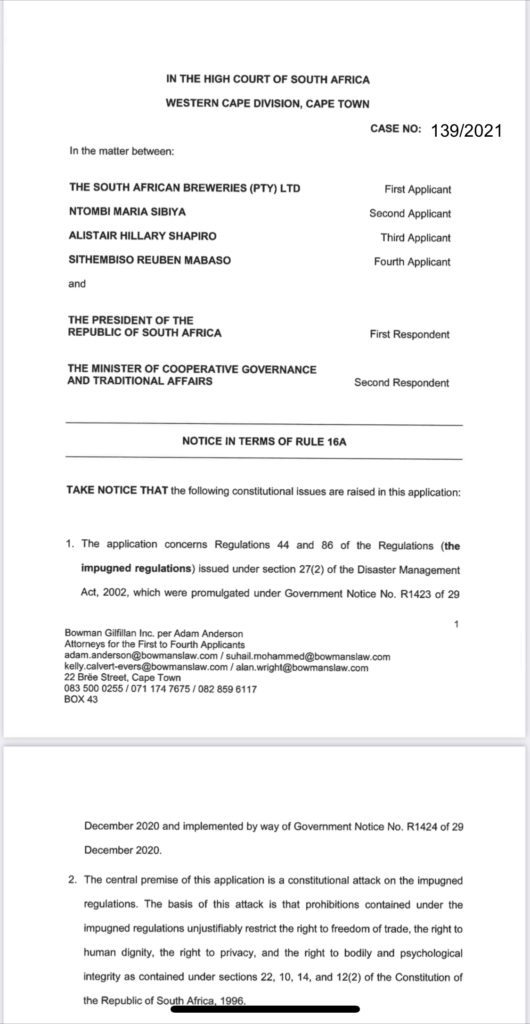As the debate continues on whether Zimbabwe has banned the sale of alcohol or not, in neighbouring South Africa, some citizens together with South African Breweries have filed an urgent application to challenge their government’s blanket alcohol ban.
Zimbabwe’s Minister of Justice, Legal and Parliamentary Affairs Ziyambi Ziyambi on Friday said the Statutory Instrument (SI) 10 of 2021, which sets the guidelines of the Level Four National Lockdown meant supermarkets were not supposed to sell alcohol besides bars and restaurants serving hotel residents.
“The SI banned the sale of alcohol in bottle stores, supermarkets, except hotels. Those chain supermarkets have segments, if they have a bottle store in the supermarkets they should be closed. I think they are correct if they are stopping the sale of alcohol,” said Minister Ziyambi to state media.
However, Permanent Secretary in the Ministry of Information, Publicity and Broadcasting Services, Nick Mangwana tweeted he was unaware that government has banned sale of alcohol
“I am not aware of any ban on sales of alcohol by licensed supermarkets. For us to do that would need to gazette such a regulation and I am advised we did not gazette such a law or regulation.”

In neighbouring South Africa, last year on December 28, President Cyril Ramaphosa reimposed a ban on alcohol sales and ordered the closure of all bars as part of new restrictions to help the country battle a resurgence of Covid-19, including a new variant.
“Reckless behaviour due to alcohol intoxication has contributed to increased transmission. Alcohol-related accidents and violence are putting pressure on our hospital emergency units,” Ramaphosa said then.
When the first ban on alcohol was effected South African brewers and wine makers complained they were being driven out of business while consumers also protested harshly.
This time around, the South African Breweries (PTY) LTD, Ntombi Maria Sibiya, Alistair Hillary Shapiro, Sithembiso Reuben Mabaso who are the first, second, third and fourth applicant respectively filed an urgent chamber application dated January 6, 2021 at Cape Town, arguing that the ban on the re-sale of alcohol is unconstitutional.
Their application cites Ramaphosa as the first respondent while Minister of Cooperative Governance and Traditional Affairs (Nkosazana Dlamini-Zuma) as the second respondent and concerns Regulations 44 and 86 of the Regulations, which the applicants are calling into question, issued under section 27(2) of the Disaster Management Act 2002 promulgated under South Africa’s Government Notice R1424 of 29 December 2020.
The central argument of SA Breweries, Sibiya, Shapiro and Mabaso’s application is that the regulations violate their constitutional rights to sell and consume alcohol.
“The basis of this attack is that prohibitions contained under the impugned regulations unjustifiably restrict the right to freedom of trade , the right to human dignity the right to privacy and the right to bodily and psychological integrity as contained under Sections 22 , 10. 14 and 12(2) of the constitution of the Republic of South Africa 1996,” reads their application.
The applicants said the government regulations, which completely prohibits them from selling, dispensing and distribution for consumption liquor products and restricted from transporting for consumption liquor products, impacts upon several constitutional rights to which they are entitled to.
The first to third applicant’s business revolve around the sale of for consumption liquor products and each of the first to third applicants have a right to freedom of trade under Section 22 of the Constitution.
The second and third applicant argued their decision to engage in the for-consumption liquor industry is a professional choice that gave them the best chance of making profits to support their families.
“In order to maintain this, the second and third applicants must be given the opportunity to make a profit through the operation of their business. By prohibiting the sale and transport of for consumption liquor, the first and second respondents have denied the second and third respondents the right to lawfully do so , thus depriving them of the vehicle through which they sustain themselves and their dependents. This constitutes an unjustifiable infringement on the second and third applicants right to dignity under section 10 of the constitution,” reads the application.
The fourth applicant, Mabaso, said he is a reasonable consumer of liquor products and has been for the duration of his adult life.

“His decision to consume liquor products in a coherent, lawful and reasonable manner is a manifestation of his right to self-autonomy which forms part of his right to human dignity, coupled with this is the fourth applicant’s right to exercise control over his own body, where such control includes the protection of one’s own autonomy and self-determination against outside interference,” reads the application.
The application argued that by prohibiting the sale of for -consumption liquor, SA Breweries and Sibiya have made it legally impossible for Mabaso to purchase these products and consume these products.
“This obviously is because one cannot consume what does not have. This constitutes an unjustifiable infringement on the fourth’s applicants right to dignity and right of bodily and psychological integrity under Section 10 and 12 (2) of the Constitution,” read the application.
Bowman Gilfillan Inc per dam Anderson Attorneys represented the first to fourth applicants.

